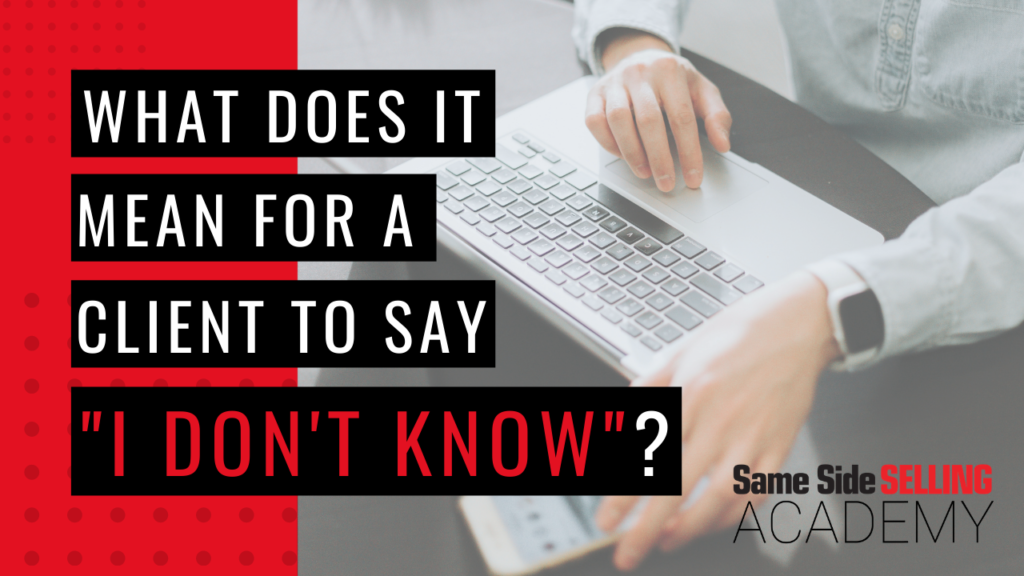One of the most frequent questions I hear is how to decide if a business opportunity is real or not. When I cover this, I give the audience several helpful questions they can ask to determine if this opportunity is one they should pursue. After all, fact-finding during the discovery phase is a critical element of uncovering the truth.
Once professionals start asking these insightful questions, they often ask me, “What if when I ask what they would measure for success or what happens if they don't solve their issue, they answer, ‘I don’t know?’”
“I don’t know,” can mean several different things, and your job is to get to the underlying truth.
Remember, effective selling isn’t about persuasion or coercion. It’s about getting to the truth as quickly as possible.

If you don’t yet have your client’s trust, they may feel that you’ll use the information they share with you against them.
In commercial insurance, for example, clients often don't want to share their current premiums because they don't want you to know what they are currently spending. Another place is in construction: "Why would I tell you my budget? Just tell me what it will cost." If the client doesn't trust the vendor, they won’t want to share their budget. This is often for fear that the contractor will assume the budget to be a green light to spend that amount, even if it isn’t necessary. Or, that they'll use that information to form the basis for their own proposal.
If you sense that behind your client’s “I don’t know,” is really a reluctance to tell you the answer, then you should take responsibility for their discomfort.
You may say something like, “I sense that I may have made you uncomfortable. What can I do to gain your trust so we can have an open discussion? We want to get a sense of your current situation." There is usually a reason that is in the client's best interest that you can raise to illustrate why they might want to share the details. If you don't have trust, then your problem goes much deeper than just the information.
Without your client’s trust, you could be stalled forever.
Let’s say you are trying to uncover their situation to uncover the impact associated with not solving their problem or the results they'd expect to see to measure success.
If they say they don’t know, it’s possible this is because they don’t have enough experience or context to answer the question. In this case, it can be helpful to ask your client questions that can lead them to the answer.
Rather than just asking open-ended questions without context, you might provide third-party examples of how others measure these items: "Our clients often use one of three different measurements for success." Then you describe each one and ask, "Which one is most similar to your situation?"
The goal is to have a discussion that lets the client see the possibilities and allows you to seek the truth.
If, after establishing trust and asking helpful questions, your client’s answer is still “I don’t know,” then it’s probably time to try to find someone else who might have the answers. What I mean is that if the person you are speaking with doesn't have any answers, then they might not be the right person.
It’s important to remember that the way you ask about speaking to another person is crucial! If you ask in the wrong way you can do damage to your relationship with your client.
One way to do this would be to say, “I’m sorry for asking all these questions. I’m just trying to determine if there is a valid case for considering moving forward. Who else might have the answers to these questions? What would be the best way for us to include them in the conversation in a way that is comfortable for you?”
It’s so important to include the person in front of you in the process of finding another person to speak with, rather than trying to go around them.
No matter what the reason is that someone says, “I don’t know,” finding the truth behind the answer helps both you and your client.
By asking simple and considerate questions you can determine if this opportunity is the right one for both parties, and build trust by staying on the same side of the table.
Have you had experience with someone saying, “I don’t know,” when they really meant something different? How did you handle this situation?



You must be logged in if you want to submit a suggestion.